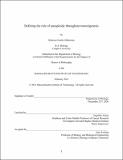Defining the role of aneuploidy throughout tumorigenesis
Author(s)
Silberman, Rebecca Estelle.
Download1251767363-MIT.pdf (92.98Mb)
Other Contributors
Massachusetts Institute of Technology. Department of Biology.
Advisor
Angelika Amon.
Terms of use
Metadata
Show full item recordAbstract
Aneuploidy is a state of genome imbalance which alters the copy number of whole chromosomes. While aneuploidy is rare in healthy tissues, it is one of the most common features of cancerous tumors. Studies of aneuploid yeast and aneuploid mammalian cells growing in culture revealed that aneuploidy induces cellular stress and slows proliferation. So it is surprising that aneuploidy is a hallmark of cancer, a disease of cellular over-proliferation and inappropriate cell survival. We sought to elucidate aneuploidy's role in tumorigenesis by defining the factors that affect the prevalence of aneuploid cells in normal, pre-cancerous, and cancerous tissues. First, we investigated whether aneuploid mammalian cells experience fitness defects in vivo. We found that aneuploidy decreases hematopoietic stem cells' fitness and that aneuploid cells are selected against in normal, regenerating tissues in vivo. However, we also found that aneuploid cells can accumulate in the hematopoietic system when purifying selection is relaxed following bone marrow reconstitution. We then sought to extend our observations to the context of pre-cancerous tissues. We analyzed the prevalence of aneuploidy in the highly tumorigenic, but histologically normal tissues of women harboring heterozygous germline BRCA2 mutations. Using single-cell sequencing, we revealed that breast cells from BRCA2 mutation carriers lack aneuploidy but feature a distinct form of genome imbalance called sub-chromosomal copy number variants (CNVs), even before the initiation of tumorigenesis. We then analyzed the timing with which these two forms of genome imbalance--whole-chromosomal aneuploidy and sub-chromosomal CNVs--arise during tumorigenesis. We found that CNVs are present in the cells of early precursors of multiple cancers, but that whole-chromosomal aneuploidy arises late in tumorigenesis. Our findings propose that whole-chromosomal aneuploidy reduces cells' fitness in both normal and pre-cancerous tissues, and that aneuploidy is selected against throughout tumorigenesis. This has implications for the role of aneuploidy in cancer, suggesting that aneuploidy does not contribute to early tumorigenesis.
Description
Thesis: Ph. D., Massachusetts Institute of Technology, Department of Biology, February, 2021 Cataloged from the official PDF of thesis. Includes bibliographical references.
Date issued
2021Department
Massachusetts Institute of Technology. Department of BiologyPublisher
Massachusetts Institute of Technology
Keywords
Biology.